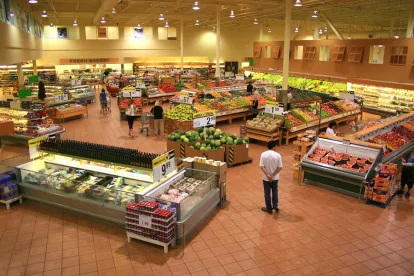Key Takeaways:
-
What Happened: On August 5, 2020, USDA proposed a significant expansion of certification and recordkeeping requirements and enforcement activities under the National Organic Program.
-
Who’s Impacted: All participants in the global organic agricultural product supply chain may be impacted, including many handlers, brokers, and other operations not currently required to be certified under USDA’s existing program.
-
What Should They Consider Doing in Response: Review the proposed rule and submit comments on or before October 5, 2020.
Seeking to protect integrity in the organic supply chain and build consumer and industry trust in the USDA Organic label, the U.S. Department of Agriculture (USDA) proposed on August 5 to substantially expand certification requirements and enforcement under the National Organic Program (NOP). The proposed changes include requiring certification for all “handlers,” foreign “exporters,” and domestic “importers” of organic agricultural products; additional requirements for certification of foreign “grower group operations”; increased unannounced on-site inspections by organic certifiers; training, evaluation, and staffing requirements for accredited certifiers; and explicit civil and criminal enforcement authority for USDA’s Agricultural Marketing Service (AMS). USDA is also proposing additional labeling and recordkeeping requirements to improve the traceability of organic products and prevent fraud, and encouraging the adoption of digital ledger technologies like blockchain throughout the organic supply chain. USDA seeks comments from stakeholders and the public by October 5, 2020.
Responding to Increased Complexity and Rising Fraud
AMS established the NOP in 2000 and through this program oversees national standards for production, handling, labeling, and sale of organically produced agricultural products. Since then, the organic industry has expanded dramatically, with total U.S. sales of organic products exceeding $55 billion in 2019.
This rapid expansion has led to increased complexity in the global organic supply chain, and premium prices for organic products have also led to a rise in organic fraud in the supply chain. For instance, the U.S. Department of Justice successfully prosecuted a $120 million organic grain fraud in Iowa, Nebraska, and Missouri in 2019, and in February 2020 a federal grand jury indicted an individual in South Dakota for allegedly selling $71 million of nonorganic grains and oilseeds falsely labeled organic for over five years. Building on various recommendations by the National Organic Standards Board since 2002, USDA intends the new proposed rule to fill oversight gaps and prevent similar fraud in the organic supply chain.
The Details
The proposed rule would be the first major overhaul of NOP regulations since 2000, and would expand certification, inspection, training, labeling, and recordkeeping requirements across the organic program and supply chain. The rule would also reinforce AMS’s power to enforce program rules with civil or criminal penalties.
If finalized, significant changes to the organic program would include:
-
Any operation that “handles” (i.e., sells, processes, or packages, including but not limited to trading, brokering, repackaging, labeling, combining, containerizing, or storing) organic agricultural products (including packaged products) must be certified, with exceptions for certain small-scale handlers, retail operations, operations that handle only partially organic products, and operations that only store, receive, or load and do not process or alter organic products.
-
All final exporters to, and importers of record into, the United States of organic products from any country must be certified either under the USDA program or under a trade agreement. Furthermore, each imported shipment of organic products must be certified and declared as organic and associated with a valid NOP Import Certificate or equivalent data source detailing the quantity and origin of the organic products.
-
Multi-member certified “grower group operations” must use centralized processing, distribution, and marketing facilities and systems and comply with enhanced documentation and inspection requirements. (These operations reduce barriers for small-scale farms in developing countries entering the global organic market, and enable the production of organic coffee, cacao, bananas, tea, and spices.)
-
Certifying agents and their inspectors must annually conduct unannounced inspections of at least five percent of the operations they certify, and must not accept applications or continue certification with operations located in areas where they are unable to do so. During inspections, certifying agents must also verify operations produce or purchase sufficient quantities of organic products to account for their sales.
-
To enhance supply chain traceability from source to consumer, organic operations would be required to maintain audit trail documentation and describe in their organic system plans the monitoring practices and procedures used to prevent organic fraud and verify suppliers. Certifying agents would be required to share information to verify supply chains, have procedures for identifying high-risk operations and products, conduct risk-based supply chain audits, and report credible evidence of fraud to USDA.
-
Certifying agents must demonstrate that their staff, volunteers, and contractors have the required knowledge, skills, and experience to inspect the operations assigned to them and must evaluate performance annually. Additionally, inspectors must have at least one year of relevant field-based experience and complete at least 20 hours of relevant training each year.
-
Certifying agents must notify AMS after certification activities begin in a new certification office, including information regarding the countries covered by that office, the nature of their activities, and the qualifications of their personnel.
-
Upon a foreign country’s request, AMS may determine that that country’s organic certification program is at least equivalent to its own program. If AMS makes such a determination, products produced and handled under that country’s organic certification program may be sold or labeled as organic in the United States.
-
The AMS Program Manager may initiate civil or criminal enforcement actions in response to any violation of the organic program rules. The proposed rule clarifies that noncertified status does not protect an operation that commits organic fraud from enforcement actions.
In addition to the above, the proposed rule includes various paperwork and recordkeeping requirements. These would include centralizing and standardizing certification and associated records in AMS’s INTEGRITY database; requiring that certified operations annually submit only revisions to their organic system plan, rather than their organic system plan in its entirety; and annual expiration of organic certificates, though not of the underlying certification.
Finally, AMS states that it will continue to work toward its goal of full supply chain traceability and fully verifiable organic products through the use of electronic tracking systems including digital ledger technology, or blockchain. AMS recognizes cost barriers to widespread adoption of this technology, as well as inadequate access to technology and connectivity in rural areas, but expects interest to grow within the organic community over time.
AMS requests that industry stakeholders and interested members of the public submit comments on the proposed rule by October 5, 2020.






 />i
/>i

